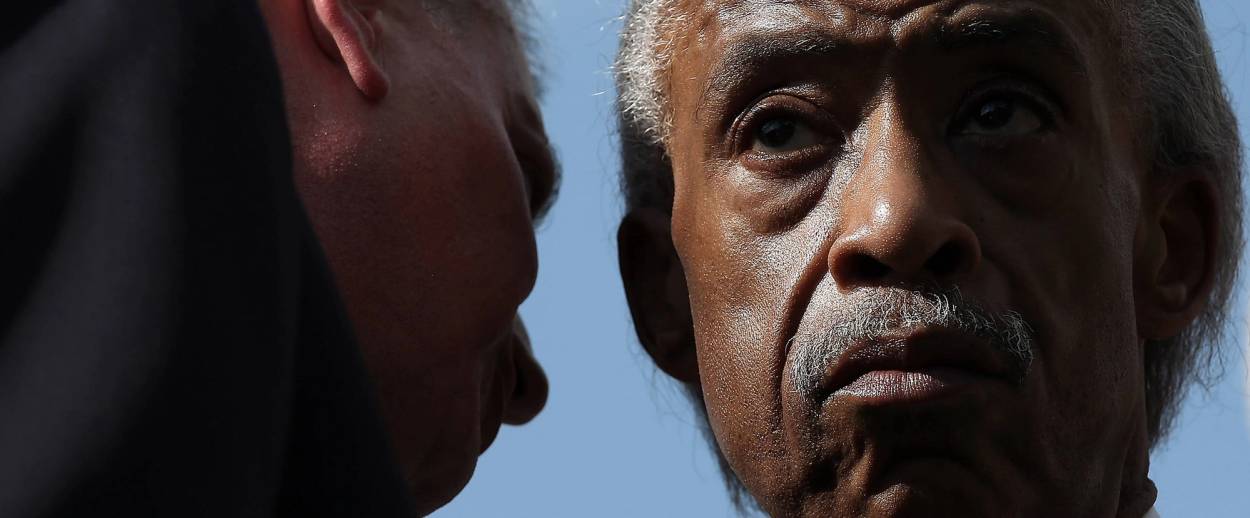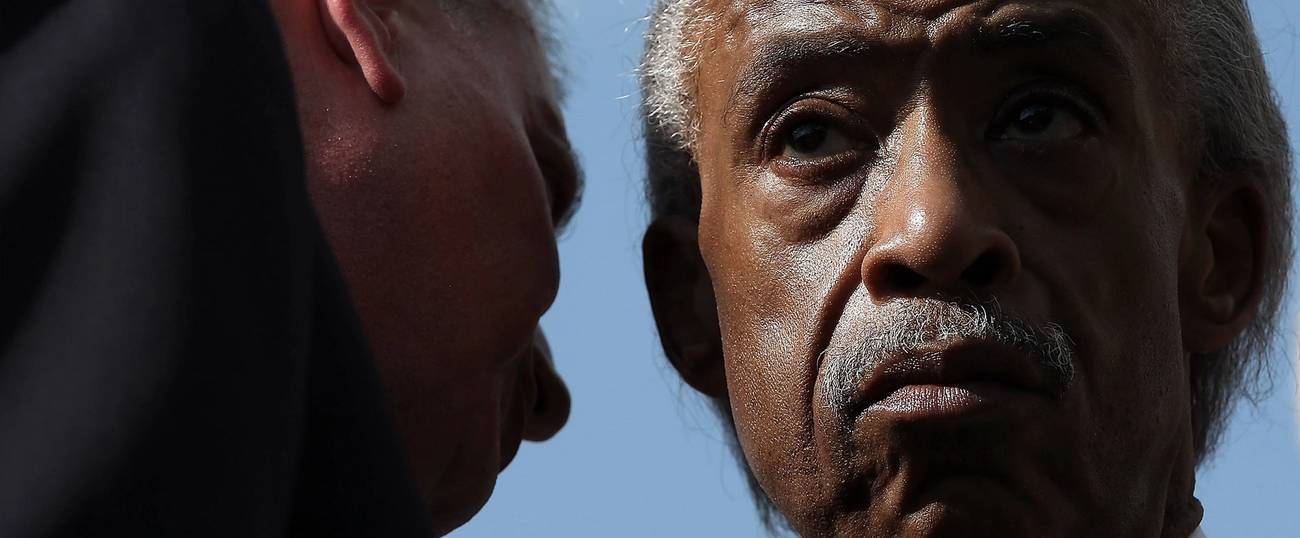A Sharpton Fan Before It Was Cool
Bill de Blasio has been kissing Al Sharpton’s ring for years. What has he known that the rest of us are only now learning?




Last week, Donald Trump goaded credulous Democratic frontrunners into kissing Al Sharpton’s ring—actions that one hopes will, at some point, cause them some shame. Aside from the grotesque theater, there was another wrinkle in the narrative: Here, finally, was a moment when Bill De Blasio could be considered first in his class.
There’s no indication that New York’s Mayor de Blasio is an anti-Semite motivated by hostility to Jews. Despite his close relationship to Sharpton, De Blasio received support from both secular and religious Jewish communities in his bid for mayor, and has been an outspoken opponent of the BDS campaign targeting Israel. But what is clear is that the mayor of New York City—the largest home to Jews in America—is bound by a set of contradictory demands that leave him unable to confront anti-Semitism honestly or effectively.
Upon becoming mayor in 2o14, following a campaign in which he’d received Sharpton’s backing, de Blasio appointed a former top Sharpton advisor to a newly created position as his wife’s chief of staff inside City Hall. A few months later, de Blasio held a roundtable on policing in which he placed himself at a table between Sharpton and his Police Commissioner, Bill Bratton, the top cop and the reverend symbolically flanking the mayor as co-equals. Later that year, when Sharpton landed in legal troubles over unpaid taxes, de Blasio deflected the charges. ”I know a lot of good people who ran into one kind of problem or another with their taxes,” he told The New York Times, calling Sharpton an “important civil rights leader.”
With some ups and downs along the way, de Blasio’s relationship with Sharpton has remained close. Yet, it’s not always clear what the mayor gets out of it. Presumably, by staying on good terms de Blasio buys himself a bit of breathing room knowing that Sharpton could always turn up the heat with demonstrations, or other less public forms of protest. But outside his activist base, Sharpton doesn’t have broad, grassroots support in New York or anywhere else, and it’s dubious whether the man once known as a kingmaker in New York politics can still bring out enough votes to matter in elections. What Sharpton can still offer is a highly visible and and highly available symbol for signifying the appearance of an interest in civil rights and the welfare of black communities, when the appearance alone will do—and yet in de Blasio’s case it seems that he might actually believe the hype.
Since 2017, de Blasio has repeatedly claimed that the ongoing surge of anti-Semitic attacks in New York city is a strictly right-wing phenomenon tied to Trump and his supporters. Faithful to the party line, he’s doubled down despite the overwhelming evidence to the contrary documented in publications like Tablet and by the mayor’s own police department. The pattern in Brooklyn, where most of the violent attacks are clustered: “the victims are most often outwardly identifiable, i.e., religious rather than secularized Jews, and the perpetrators who have been recorded on CCTV cameras are overwhelmingly black and Hispanic,” as Armin Rosen wrote last month.
In February 2017, the New York Police Department reported an 81% increase in hate crimes compared to the same period in 2016, an increase largely caused by a 115% rise in incidents targeting Jews. Days after the NYPD report, in his weekly “Ask the Mayor” radio appearance, de Blasio addressed the spike in attacks: “The horrible, hateful rhetoric that was used in this election by candidate Trump and by a lot of his supporters directly connects to an increase since the election in anti-Semitic incidents, anti-Muslim incidents and anti-LGBT incidents.”
More than once, de Blasio has condemned anti-Semitism and the attacks that have occurred year after year, under his watch. But he avoids treating the surge of anti-Semitic acts as a matter of specifically Jewish concerns, or as a problem like traffic deaths and lead levels in public buildings—both of which he has promised to eradicate—that can be solved. Instead, following the nebulous but increasingly zealous edicts of modern progressivism, de Blasio speaks about anti-Semitism as if it were a subordinate aspect of a larger, totalizing form of oppression—in a word, white supremacy.
“The forces of white supremacy have been unleashed and as you know those are profoundly anti-Semitic forces,” de Blasio said during a press conference in May 2019. The deeply rooted connections between the ideologies of anti-Semitism and white supremacy not being in dispute it was, nevertheless, unclear how the connection applied to the specific incident the mayor was addressing in which a visibly nonwhite assailant, later identified as Hispanic, was captured on video spitting in a Jewish man’s face.
“I think the ideological movement that is anti-Semitic is the right-wing movement,” de Blasio said in June, before amplifying the point. “I want to be very, very clear, the violent threat, the threat that is ideological is very much from the right.”
It was a defiantly preposterous thing to claim given the number of these incidents captured on film that involve nonwhite attackers with no discernible ties to right-wing politics. De Blasio could, of course, point to the other, far more violent attacks against Jews in places like Pittsburgh and Poway, that were clearly the result of a growing, murderous right-wing ideology. But these weren’t the attacks taking place in New York City on a regular basis, targeting people whose safety is the mayor’s responsibility.
This blind spot for ideologically inconvenient facts is deeply embedded in the ethos of modern progressivism and at the highest levels of the Democratic Party. To see how it plays out in practice, look at what happened last year with the Women’s March. Led by three women of color, the group enjoyed fawning praise from the media and politicians like Sen. Kirsten Gillibrand, while openly cheering the reactionary Nation of Islam head, Louis Farrakhan, and trafficking in anti-Semitic tropes. By no coincidence, the leader of the March most directly implicated was a Sharpton protege and former executive director of the National Action Network.
***
Like this article? Sign up for our Daily Digest to get Tablet magazine’s new content in your inbox each morning.
Jacob Siegel is Senior Editor of News and The Scroll, Tablet’s daily afternoon news digest, which you can subscribe to here.